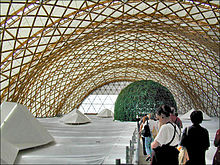Shigeru Ban | |
|---|---|
 Shigeru Ban, 2011 | |
| Born | 5 August 1957 Tokyo, Japan |
| Nationality | Japanese |
| Alma mater | Cooper Union for the Advancement of Science and Art |
| Occupation | Architect |
| Spouse | Masako Ban |
| Awards | Pritzker Prize (2014) |
| Buildings | Centre Pompidou-Metz, France Cardboard Cathedral, Christchurch, New Zealand, Aspen Art Museum, US[1] |
| Website | www |



Shigeru Ban (坂 茂, Ban Shigeru, born 5 August 1957)[2] is a Japanese architect, known for his innovative work with paper, particularly recycled cardboard tubes used to quickly and efficiently house disaster victims. Many of his notable designs are structures which are temporary, prefabricated, or incorporate inexpensive and unconventional materials in innovative ways. He was profiled by Time magazine in their projection of 21st-century innovators in the field of architecture and design.[3]
In 2014, Ban was named the 37th recipient of the Pritzker Architecture Prize, the most prestigious prize in modern architecture.[4] The Pritzker Jury cited Ban for his innovative use of material and his dedication to humanitarian efforts around the world, calling him "a committed teacher who is not only a role model for younger generation, but also an inspiration."[4]
- ^ "Shigeru Ban's Aspen Art Museum opens". Dezeen.com. 6 August 2014. Retrieved 25 August 2014.
- ^ Biography Archived 25 March 2014 at the Wayback Machine, The Hyatt Foundation, retrieved 26 March 2014
- ^ Luscombe, Belinda (17 July 2000). "Innovators, Time 100: The Next Wave – He Builds With a Really Tough Material: Paper". Time. Time Warner. Archived from the original on 10 May 2011.
- ^ a b "Shigeru Ban named 2014 Pritzker Prize Winner". ArchDaily. 24 March 2014. Retrieved 24 March 2014.